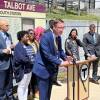Gov. Charlie Baker defended mounting pressure by his administration on the question of receivership for Boston Public Schools, saying BPS officials “need a plan” to address a series of long-standing issues.
Speaking on behalf of his education commissioner, Jeff Riley, Baker said “he needs a major commitment from the city to execute on a plan.”
Riley initially filed a report in February 2020 highlighting the problems within BPS, which include getting students to school on time, unmet needs of special education and non-English speaking students, and dysfunctional bathroom facilities.
Public opposition to a potential state takeover has been fierce following a new report issued on Monday that showed little improvement in the two years since the first assessment, though Baker briefly acknowledged added complications brought on by the pandemic.
“[Commissioner Riley] was getting increasingly worried about the fact that there wasn’t much progress made about what was in the original report,” the governor said. “And worse than that, he saw a lot of significant slides in other areas, including safety.”
Baker added, “So far the message from most of the legislators, city councilors, school committee members — everybody — has been ‘don’t put us in receivership.’ Okay, what then?”
More Local News
“People have to actually say what they will do to deal with the very real and indisputable conclusions that were drawn in that report,” he said.
Boston officials have been adamant about maintaining independence from state leadership. In a Boston Public Radio segment earlier in the week, Boston Mayor Michelle Wu cited the needs of the system’s incoming superintendent, saying that person ought to have every resource at hand to address the schools’ shortcomings.
“We are now just weeks away from identifying a new superintendent,” she said Tuesday. “That superintendent, that leader, needs to be fully empowered with all the decision making and resources they need to move quickly on these big challenges.”
During the Friday conversation, Baker also defended a lack of public transparency on safety concerns related to the MBTA, in light of an ongoing report by the Federal Transit Authority on the matter. The group’s inspection, which began in April, came on the heels of several safety-related incidents on the T, including the April death of Robinson Lalin. Lalin was dragged to his death after a Red Line train door closed on his arm.
“The FTA is the public entity that makes the call with respect to how to speak about what their plans are and what they’re up to, not the MBTA,” Baker said. “If the FTA says to the T: ‘we are engaged in an investigation, and as your overseer we do not want you speaking publicly about it until we finish our investigation and we decide what we’re gonna say’ ... you need to follow that guidance.”
Baker was also asked for his thoughts on Tuesday’s mass shooting at an elementary school in Uvalde, Texas.
The governor, audibly shaken, expressed horror at the deaths of 19 children and frustration with the federal government’s inability to address a decades-long string of mass shootings.
“I really wish the feds would do some very common-sense things that I believe most Americans can and would support to deal with some of these issues,” he said, adding “I don’t get it.”
The governor then pointed to Massachusetts’ success implementing regulations on the sale of firearms. Massachusetts is currently has one of the lowest rates of gun deaths in the United States, to which Baker said he’s “not surprised.”
“I will say this,” he told hosts Jim Braude and Margery Eagan. “Massachusetts has never had the same problem on gun legislation. It’s always been an open conversation. And Democrats and Republicans, at the end of the day, have signed off on pretty much every piece of legislation I can think of going back at least ten years.”








